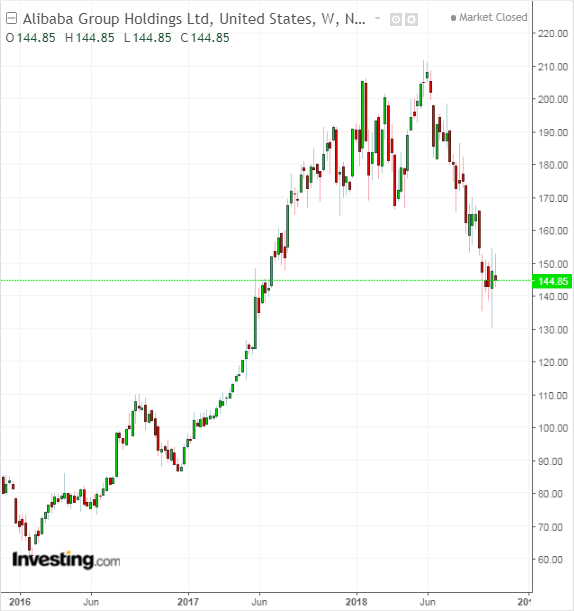Alibaba (NYSE:BABA), the China-based e-commerce giant, has once again put together an impressive show in conjunction with its much-hyped “Singles Day,” shopping festival. The annual event, which always takes place on November 11, has shattered all global sales records, racking up more than $30.8 billion in online sales in 24 hours.
The retail behemoth’s Singles Day, which Alibaba created and launched in 2009, has ballooned into the world’s biggest shopping phenomenon, providing an important insight into the appetites and fiscal health of Chinese consumers. This year’s event is additionally significant: it affords a view into Chinese consumer confidence, as the world’s second-largest economy remains embroiled in a costly trade war with the US.
Still, despite the stunning performance seen yesterday by the company that controls 58% of the Chinese e-commerce market, Alibaba's beaten-down shares, currently trading at just under $145 as of Friday's close, are unlikely to reverse anytime soon.

Since this summer, when the stock hovered just under $211, shares have been on a slippery downward slope, losing more than a quarter of their value since reaching a record high in June.
Powerful Fundamental Headwinds
The main reason for this bearish outlook: powerful headwinds slowing the company’s growth and endangering its short-term outlook. In its most recent earnings report, released on Friday, November 2, Alibaba cut its annual revenue forecast after quarterly sales missed estimates, underscoring the extent to which escalating tensions with the US are hurting the Chinese economy.
China’s e-commerce giant now sees full-year revenue of 375 billion yuan ($53.9 billion) to 383 billion yuan, the company said during its earnings call. That’s 4-6% percent lower than it had previously forecast. Second-quarter sales came in 1.6% below analyst estimates.
At a time when growth is slowing, Alibaba is spending heavily to build scale in Southeast Asia, a region that’s central to its global growth. The online retailer is investing in physical stores, delivery services, digital media and entertainment, as well as cloud computing.
Pressure On Margins
Most of these businesses, which are outside of the company’s e-commerce core empire, burn cash. As such they'll be a considerable drag on Alibaba's bottom line. That means the company’s operating margins will remain under pressure for quite some time as costs escalate and profitability slows.
Beyond trade tensions, Chinese internet stocks are also confronting a tough operating environment locally. Alibaba has been facing rising competition from smaller players, such as JD.Com Inc. (NASDAQ:JD) and Pinduoduo Inc. (NASDAQ:PDD).
Amid this uncertainty, Chinese regulators have increased their clampdown on the country’s internet sector, reining in everything from gaming apps and travel sites to ride-hailing services. That’s exacerbating Alibaba's already slowing business growth.
Bottom Line
Alibaba's stunning Singles Day performance will undoubtedly provide some relief to investors who were expecting a drastic slowdown in Chinese consumer spending. But, in our view, that one day record alone isn’t enough to reverse the trend in Alibaba’s declining shares.
The near-term future of the stock depends on the resolution of global trade disputes and how quickly both countries involved are able to strike a deal. The market consensus is that Alibaba shares will rebound once the geopolitical issues are resolved and Chinese stocks begin to once again trade on their actual fundamentals. The majority of analysts on Wall Street have a buy rating on Alibaba, with an average $205 price target, implying about a 30% upside potential from Friday’s close.
Though we don't see much upside in the short run, longer term, we remain bullish on Alibaba shares. The mega e-tailer provides unique exposure to the world’s second largest economy as well as Asia’s other emerging markets. And the recent dip offers a good entry point for buy-and-hold investors.
